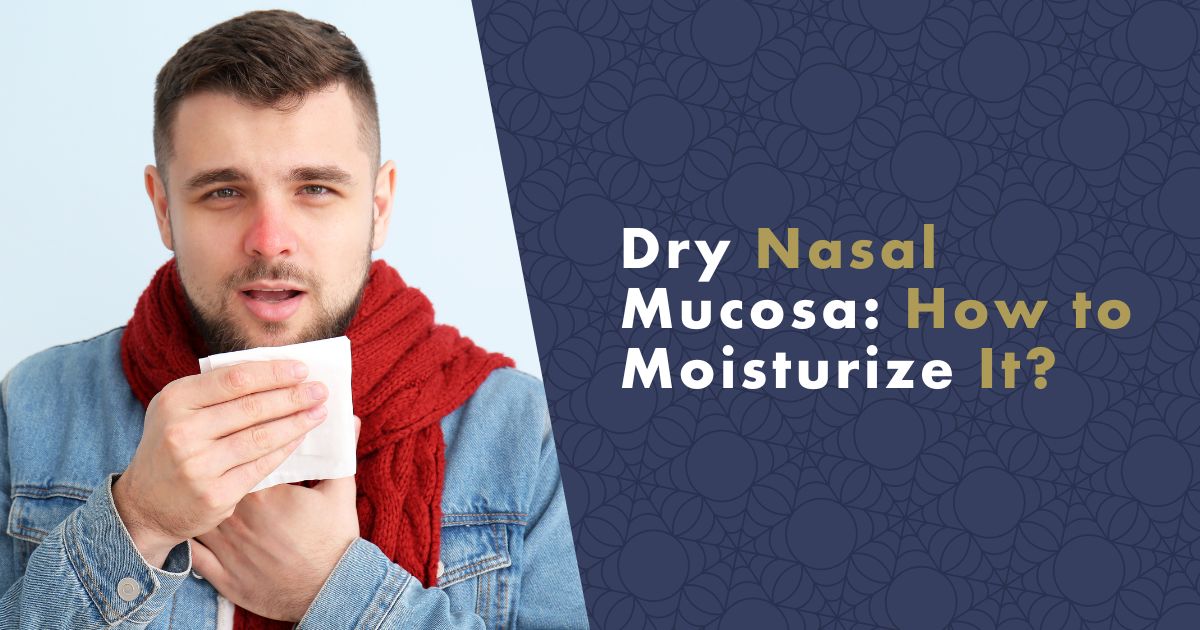Boosting the body's defenses is primarily achieved through cold exposure and a healthy lifestyle. This also includes proper body hydration. Water is vital for the body as every cell needs it for its metabolism. We should not forget about moisturizing the nasal mucosa either. Why is it so essential and how can we achieve the right level of humidity?

Why Is It Necessary to Moisturize the Nose?
The internal surfaces of our body, particularly those lining the digestive, respiratory, and urinary tracts, are covered by mucous membranes. They are potential points of entry for infections into the body and can be considered as the first line of defense. They are protected against the invasion of viruses, bacteria, fungi, toxins, and other harmful substances by the mucosal immune system.
The mucous membranes of the nose, nasopharynx, lungs, and intestines act as barriers due to their structure, which has secretory and absorptive functions. However, this is true only under suitable conditions. For the respiratory system, for example, it means constant moisturization, which can be achieved by maintaining an adequate hydration regimen.
If a person spends time in overheated and poorly ventilated rooms or suffers from acute, allergic, or chronic rhinitis, the nasal mucosa becomes dry. This makes it less resistant to further infection.
Most Common Causes of Dry Nasal Mucosa
- Dry and warm air in the room.
- Viral or bacterial infections.
- Inadequate hydration of the body.
- Excessive and improper use of nasal sprays.
- Seasonal allergies and the use of antihistamines.
- Inadequate support of immunity.
- Smog, dust, molds, or smoking.
What to Do When You Have a Runny Nose
Rhinitis, also known as a runny nose, is an inflammatory condition of the nasal mucosa characterized by swelling and watery, later mucous discharge. The basis of its symptomatic treatment is an adequate intake of fluids, which will internally moisturize the nasal mucosa and alleviate the symptoms. Sometimes external assistance is necessary as well.
#produkty#https://www.nanospace.store/nasal-sprays/
Tip: Read the article to learn how to distinguish between a common cold and the flu.
You can purchase moisturizing drops and nasal sprays at pharmacies to alleviate discomfort. However, some nasal sprays are not intended for long-term use. Prolonged use can lead to dryness in the nose, worsen nasal congestion, and cause swelling. In more severe cases, it can even lead to damage to the nasal mucosa.
Therefore, it is more advisable to opt for non-addictive products such as natural sprays. One effective option is the moisturizing nasal spray NasoGEL with hyaluronic acid and aloe vera. For allergic rhinitis, it is recommended to use NasaMist nasal spray.
Nasal Irrigation with Saline Solution
Since a runny nose is a common condition that often occurs during the damp autumn and winter seasons, it's beneficial to have a saline spray with seawater at home. Seawater is an ideal nasal moisturizer because:
- It does not cause dependency and can remove dry mucus, dust, and impurities, including allergens.
- It moisturizes the nasal mucosa and improves breathing comfort.
- It has a beneficial effect on the cilia, which play an important role in fighting infections.
If you don't have a saline spray with seawater at home, you can make a saline solution using readily available ingredients. Dissolve 2.7g of table salt in 300ml of boiled water. For nasal irrigation, the Rhino Horn neti pot is used as an effective treatment and prevention of runny nose. It's important to monitor the salt concentration to avoid irritation and damage to the nasal mucosa.
To perform the nasal irrigation, pour the saline solution into one nostril and let it flow out through the other nostril. Repeat the process for both nostrils. The nasal flush pot can be used by adults and children aged five and above.
Isotonic vs Hypertonic Saline Solution
For daily nasal moisturization of the nasal mucosa, which serves as a prevention against illnesses, an isotonic or physiological saline solution is used. It contains a salt concentration similar to that of human cells. Therefore, its regular use is not a problem. However, it is not suitable for treating severe runny nose.
Hypertonic saline solution has a higher salt concentration than that of human cells. It can help with a stuffy nose, making it more suitable for relieving nasal symptoms during cold and flu.
#produkty#https://www.nanospace.store/search/?string=hypertonic
Tip: To boost immunity in adults and children, try our 12 tips as a preventive measure.
Measures to Improve a Stuffy Nose
In addition to alleviating symptoms, it is advisable to limit time spent in overheated rooms for the treatment of a runny nose. Such rooms have dry air, which is not beneficial for the nasal mucosa. A solution can be provided by air humidifiers, which deliver the necessary amount of disinfected mist into the air. Choose devices with adjustable timers and programmable humidity controllers, which will facilitate control and improve comfort in your living space.
As a preventive measure for the nasal mucosa, you can also choose immune system supplements. For comprehensive support of your immune system, we recommend choosing Immunity Complex, which contains vitamins D3, C, and zinc. If we don't regularly spend time in the sun from autumn to spring, it is necessary to supplement vitamin D.
Sources:
- Clinical Study and Literature Review of Nasal Irrigation
- Adappa, N.D., Wei, C.C., & Palmer, J.N. (2012). Nasal irrigation with or without drugs: the evidence. Current Opinion in Otolaryngology & Head and Neck Surgery, 20(1), 53-57. doi:10.1097/MOO.0b013e32834dfa80.
- Kanjanawasee, D., Seresirikachorn, K., Chitsuthipakorn, W., & Snidvongs, K. (2018). Hypertonic Saline Versus Isotonic Saline Nasal Irrigation: Systematic Review and Meta-analysis. American Journal of Rhinology & Allergy, 32(4), 269-279. doi:10.1177/1945892418773566.
- Little, P., Stuart, B., Mullee, M., Thomas, T., Johnson, S., Leydon, G., Rabago, D., Richards-Hall, S., Williamson, I., Yao, G., Raftery, J., Zhu, S., & Moore, M. (2016). Effectiveness of steam inhalation and nasal irrigation for chronic or recurrent sinus symptoms in primary care: a pragmatic randomized controlled trial. CMAJ Sep 2016, 188(13), 940-949. doi:10.1503/cmaj.160362.
- Papsin, B., & McTavish, A. (2003). Saline nasal irrigation: Its role as an adjunct treatment. Canadian Family Physician, 49(2), 168-173.


